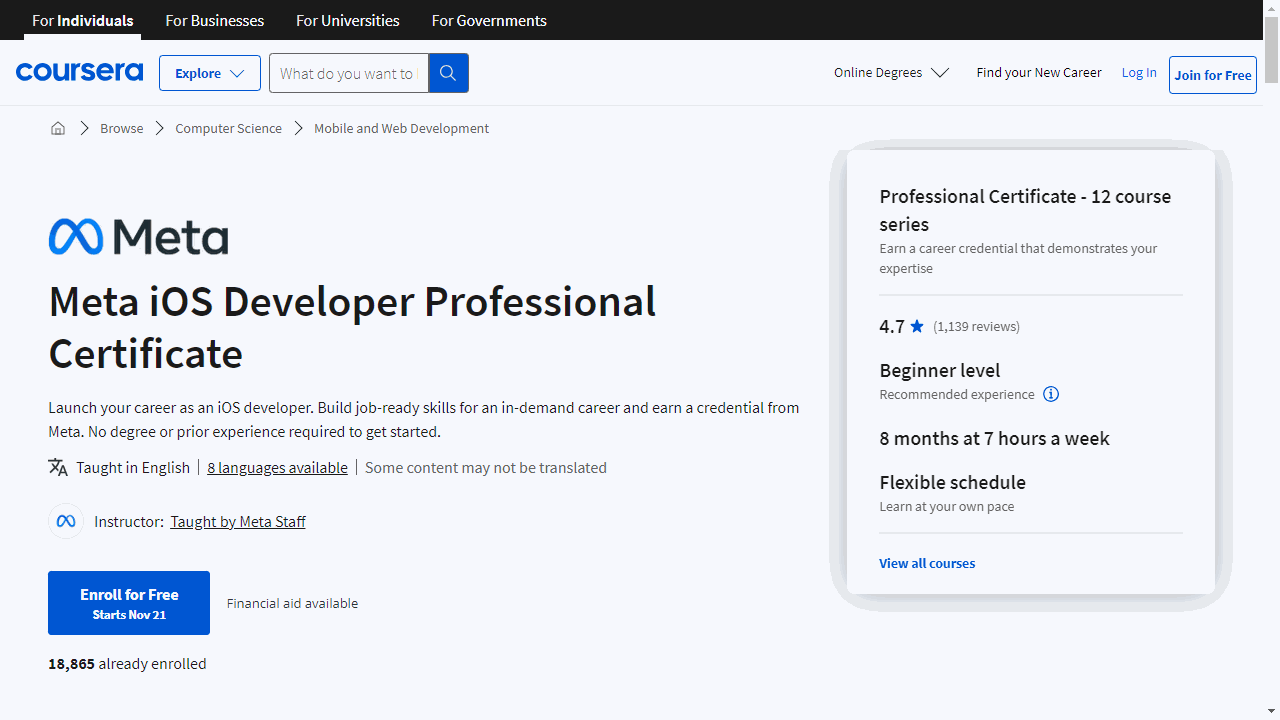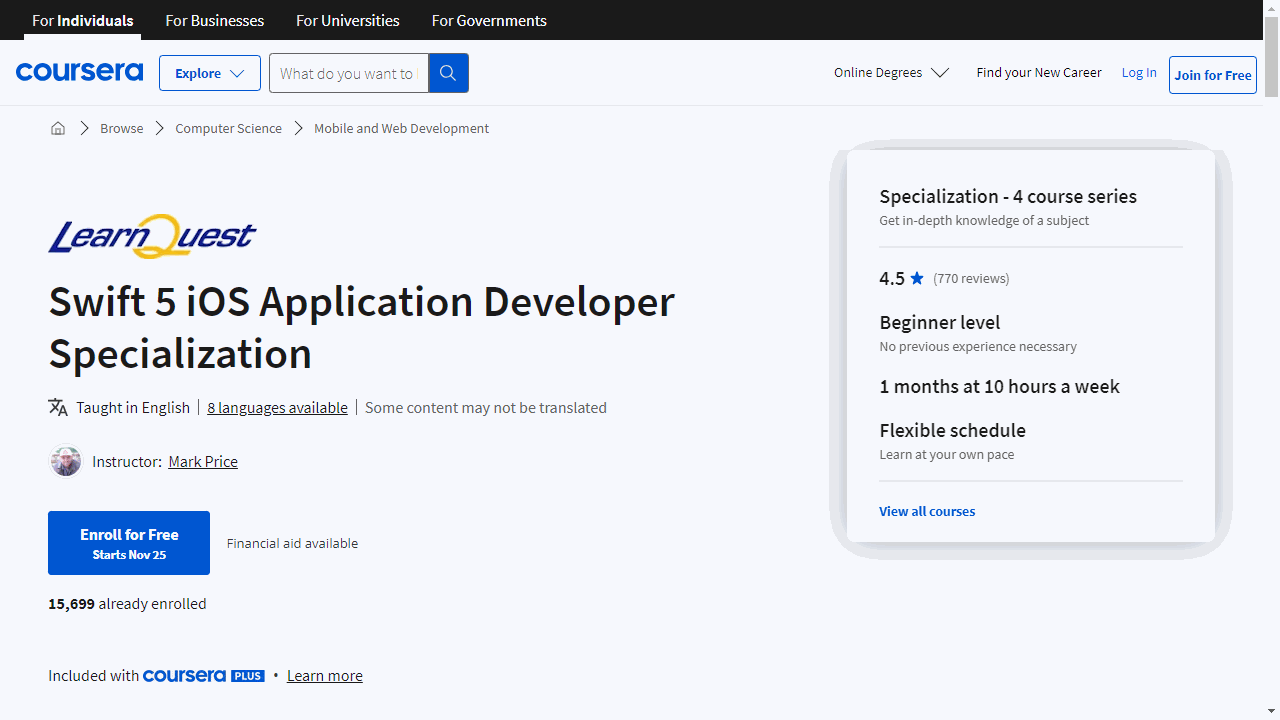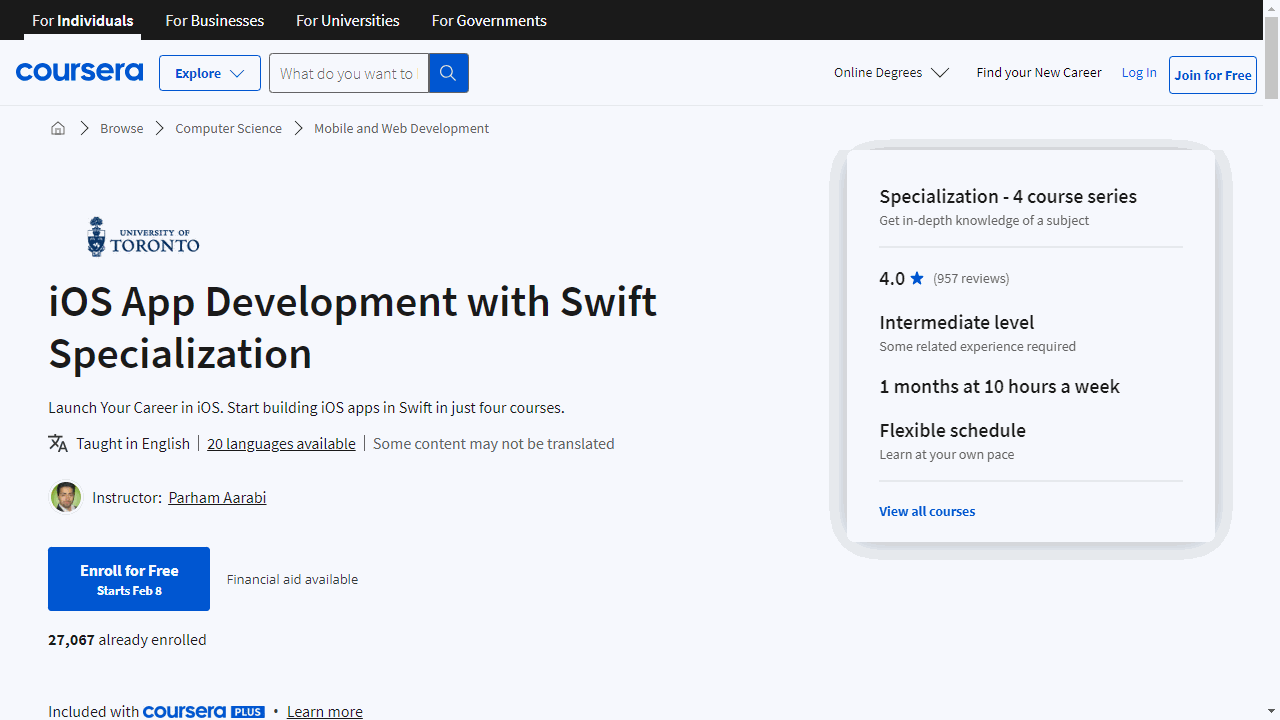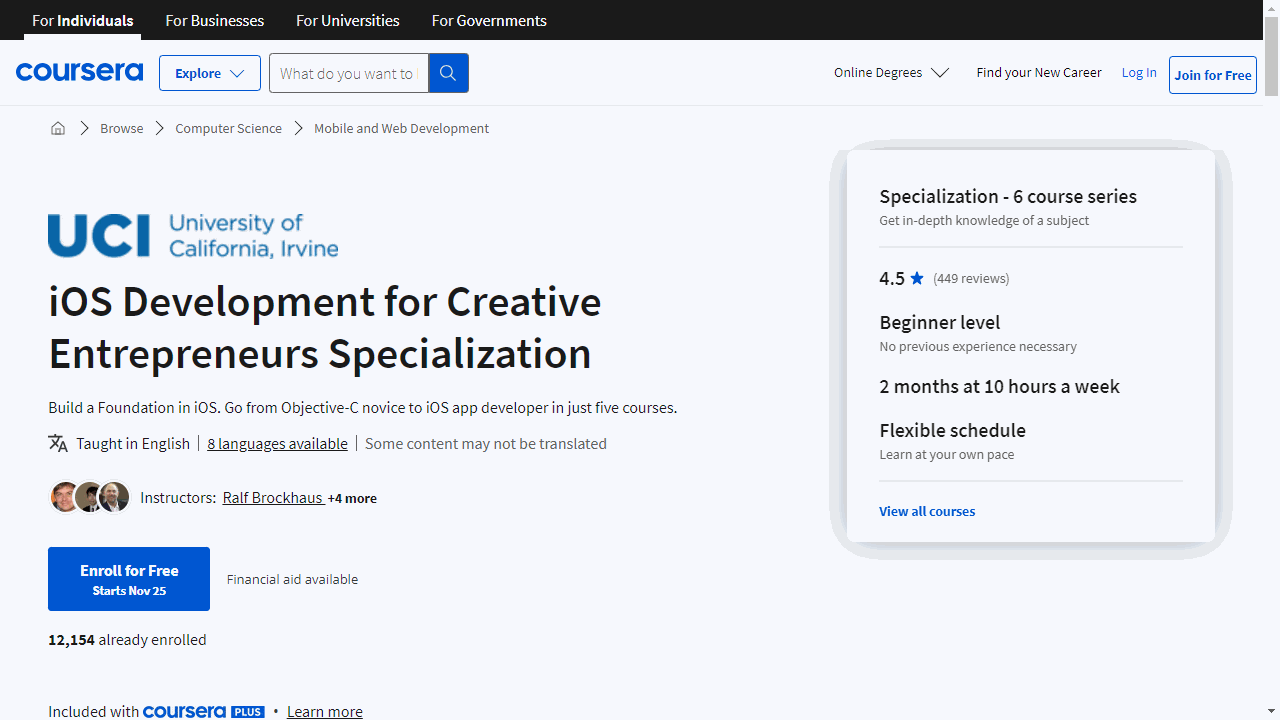Learning Swift, the powerful programming language for creating iOS apps, can be an exciting yet daunting endeavor.
Finding the right Swift course on Coursera can feel like sifting through a haystack—you want something comprehensive, engaging, and taught by experts, but also tailored to your learning style and goals.
Fear not, we’ve done the hard work for you!
After carefully evaluating the best Swift courses on Coursera, we’ve identified our top picks.
For the best Swift course overall, we wholeheartedly recommend Meta iOS Developer Professional Certificate.
This comprehensive program not only teaches you the ins and outs of Swift, but also equips you with a deep understanding of the entire iOS app development lifecycle, from design to deployment.
You’ll learn everything from the basics of Swift programming to advanced concepts like data management and UI design, making it an ideal choice for both beginners and seasoned developers.
Don’t worry if this isn’t quite what you’re looking for—we’ve got more!
Keep reading to discover other top-rated Swift courses on Coursera for beginners, intermediate learners, and experts, as well as specializations focusing on specific app development techniques and frameworks.
Meta iOS Developer Professional Certificate
Embarking on a career in iOS development requires a solid foundation and a diverse skill set, which is precisely what the “Meta iOS Developer Professional Certificate” on Coursera offers.
This comprehensive program is designed to equip you with the essential tools and knowledge needed to excel in the field.
The journey begins with “Introduction to iOS Mobile Application Development,” where you’ll familiarize yourself with the iOS platform and Swift programming language.
This course sets the stage by introducing you to XCode and Swift playgrounds, enabling you to write your first lines of code and understand the iOS app ecosystem.
As you progress to “Version Control,” the focus shifts to collaboration and efficiency.
You’ll learn to navigate Git and GitHub, essential tools for managing code in a team setting.
The course also covers Linux commands, which are invaluable for streamlining your development process.
For those new to programming, “Programming Fundamentals in Swift” breaks down the basics.
It’s a deep dive into the core concepts of Swift, from variables and data types to functions and closures, ensuring you have a strong grasp of the language’s fundamentals.
Design is just as critical as development, and “Principles of UX/UI Design” addresses this by teaching you to create user-centric designs.
Through research and tools like Figma, you’ll learn to craft interfaces that are both visually appealing and functional.
With “Create the User Interface with SwiftUI,” you’ll apply your design knowledge to build intuitive user interfaces.
This course covers a range of UI components and teaches you how to implement them using SwiftUI, enhancing the user experience of your apps.
“Advanced Programming in Swift” is tailored for those ready to tackle more complex programming challenges.
It covers advanced topics such as custom data types, error handling, and unit testing, preparing you to write sophisticated and reliable code.
Data is at the heart of modern apps, and “Working with Data in iOS” ensures you’re adept at handling it.
You’ll explore APIs, asynchronous programming, and Core Data, skills necessary for creating dynamic and responsive apps.
The program also includes “Mobile Development and JavaScript,” which introduces you to JavaScript and sets the stage for cross-platform development.
This course is a stepping stone to using React for building versatile mobile applications.
“React Basics” and “React Native” further expand your development repertoire, focusing on building scalable and maintainable web and mobile applications with React.
You’ll learn about components, state management, and navigation, among other key React concepts.
The “iOS App Capstone” is where you’ll synthesize all you’ve learned by developing a native iOS app.
This project-based course allows you to apply your skills in a practical setting, culminating in a portfolio-worthy piece that demonstrates your capabilities to employers.
Lastly, “Coding Interview Preparation” readies you for the job market.
It covers problem-solving strategies, computer science fundamentals, and interview techniques, giving you the confidence to ace technical interviews.
This program is meticulously crafted to provide a well-rounded education in iOS development.
It’s not just about learning to code; it’s about understanding the entire app development lifecycle, from concept to design, development, and deployment.
Swift 5 iOS Application Developer Specialization
This is a comprehensive program that equips you with the essentials of iOS app creation using Swift 5, Apple’s robust programming language.
The journey begins with “Introduction to Programming in Swift 5,” where you’ll grasp the basics of Swift.
You’ll set up Xcode, understand data types, and delve into object-oriented programming.
This foundation is crucial for building simple Swift programs and sets the stage for more advanced development.
Moving on to “Introduction to iOS App Development with Swift 5,” you’ll apply your Swift knowledge to actual app development.
You’ll navigate through interface building, manage user interactions, and ensure your code’s reliability with unit testing.
The course empowers you to construct functional iOS applications ready for user engagement.
Data handling is crucial, and “Tables, Data & Networking in iOS” addresses this by teaching you to efficiently present data using tables and Core Data.
You’ll also learn to connect with web servers, fetching and posting data, which is vital for dynamic app content.
Lastly, “iOS App Store & In-App Purchases” reveals the secrets to monetizing your apps.
You’ll explore various revenue streams, including in-app ads, purchases, and subscriptions, and understand how to polish and publish your app on the Apple App Store.
iOS App Development with Swift Specialization
Provider: University of Toronto
This series guides you from Swift programming basics to crafting your own iOS app, ensuring a comprehensive learning experience.
Starting with “Introduction to Swift Programming,” you’ll dive into Swift’s syntax, object-oriented principles, and memory management.
This course lays a solid foundation in Swift, preparing you for more advanced topics.
Although it currently uses Swift 2, updates to Swift 3 are planned, keeping the content fresh.
The second course, “iOS App Development Basics,” builds on your skills by introducing you to Xcode, Core iOS, and Cocoa Touch frameworks.
You’ll learn how to create user interfaces and understand MVC Architecture, essential for app development.
This course is ideal for expanding your programming toolkit.
Moving to “App Design and Development for iOS,” your abilities will be pushed further.
You’ll explore graphical element presentation, data manipulation, core graphics, and animations.
By the end of this course, you’ll be equipped to develop advanced, fully functioning apps, enhancing your app development prowess.
The specialization culminates with “Build Your Own iOS App,” a capstone project that challenges you to apply everything you’ve learned.
This hands-on course is your opportunity to develop a high-quality app, showcasing your accumulated skills.
For the best experience, you’ll need a Mac computer, and ideally an iPhone, iPod, or iPad.
While the specialization currently focuses on Swift 2, the transition to Swift 3 is in progress, ensuring you’re learning with the latest standards.
iOS Development for Creative Entrepreneurs Specialization
This comprehensive suite of courses is designed to equip you with the essential skills needed to create compelling and secure iOS, iPadOS, and watchOS applications.
The specialization kicks off with “Foundations of Objective-C App Development,” where you’ll gain a solid understanding of Objective-C, the foundational language for iOS development.
You’ll learn to navigate objects and blocks, setting the stage for more complex programming tasks.
A Mac is required, but an iOS device is not mandatory, as a simulator can be used for testing.
As you progress to “Networking and Security in iOS Applications,” you’ll delve into the intricacies of connecting apps to web services and ensuring data security.
This course is practical, with code tutorials that guide you through building apps with social media integration, secure authentication, and push notifications.
Design enthusiasts will appreciate “Best Practices for iOS User Interface Design,” which focuses on crafting aesthetically pleasing and user-friendly interfaces.
You’ll explore UI widgets, animations, and responsive design, ensuring your apps are both attractive and functional.
For those drawn to gaming or interactive media, “Games, Sensors and Media” offers a deep dive into the exciting world of iOS gaming.
You’ll leverage the iPhone and iPad’s sensor hardware to create immersive experiences, from simple Pong-like games to complex environments with physics engines and multi-touch interactions.
The course “Toward the Future of iOS Development with Swift” introduces you to Swift, Apple’s innovative programming language.
You’ll learn how Swift complements Objective-C and get hands-on experience building a client-server application, preparing you for development on emerging platforms like Apple Watch (watchOS).
Finally, “iOS Project: Transreality Game” is where you’ll synthesize your new skills.
This project-based course challenges you to create a networked game that incorporates physical movement and location-based features, culminating in a portfolio-ready product.
Each course in this specialization is rich with practical applications, from writing code to designing interfaces and securing data.
Also check our posts on:




